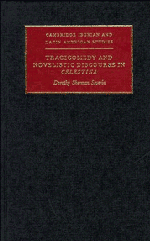
-
Select format
-
- Publisher:
- Cambridge University Press
- Publication date:
- March 2012
- June 1989
- ISBN:
- 9780511898013
- 9780521122832
- Dimensions:
- Weight & Pages:
- Dimensions:
- (216 x 140 mm)
- Weight & Pages:
- 0.39kg, 156 Pages
You may already have access via personal or institutional login- Subjects:
- Literature, Area Studies, Literary Theory, European Literature, European Studies
Book description
The late fifteenth-century Spanish masterpiece Celestina is one of the world's classics. In this important study, Dorothy Sherman Severin investigates how Fernando de Rojas' work in dialogue, which parodies earlier genres, is a precursor of the modern novel. In Celestina, the hero Calisto parodies the courtly lover, the heroine Melibea lives through classical examples and popular students' knowledge, the bawd and go-between Celestina deals a blow to the world of wisdom literature, and Melibea's father Pleberio gives his own gloss on the lament. There is also a fatal clash between two literary worlds, that one of the self-styled courtly lover (the fool) and the prototype picaresque world of the Spanish Bawd and her mentors (the rogues). The voices of Celestina are parodic, satiric, ironic and occasionally tragic, and it is in their discourse that the dialogue world of the modern novel is born. In order to make this book accessible to a wider English-speaking readership, quotations from the text are accompanied by English translations, mainly from the seventeenth-century English version by James Mabbe.
Contents
Metrics
Altmetric attention score
Full text views
Full text views help Loading metrics...
Loading metrics...
* Views captured on Cambridge Core between #date#. This data will be updated every 24 hours.
Usage data cannot currently be displayed.
Accessibility standard: Unknown
Why this information is here
This section outlines the accessibility features of this content - including support for screen readers, full keyboard navigation and high-contrast display options. This may not be relevant for you.
Accessibility Information
Accessibility compliance for the PDF of this book is currently unknown and may be updated in the future.


